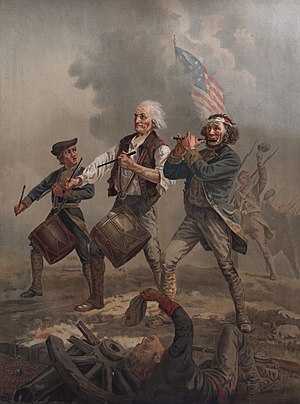Yankee Doodle
| "Yankee Doodle" | |
|---|---|
 The first verse and refrain of Yankee Doodle, engraved on the footpath in a park. | |
| Song | |
| Published | 1780s |
"Yankee Doodle" is a well-known American song, the early versions of which date to before the Seven Years' War and the American Revolution.[1] It is often sung patriotically in the United States today and is the state anthem of Connecticut.[2] Its Roud Folk Song Index number is 4501. The melody is thought to be much older than both the lyrics and the subject, going back to folk songs of Medieval Europe.[3][4]
Origin[edit]
The tune of Yankee Doodle is thought to be much older than the lyrics, being well known across western Europe, including England, France, Netherlands, Hungary, and Spain.[3] The earliest words of "Yankee Doodle" came from a Middle Dutch harvest song which is thought to have followed the same tune, possibly dating back as far as 15th-century Holland.[5][6] It contained mostly nonsensical words in English and Dutch: "Yanker, didel, doodle down, Diddle, dudel, lanther, Yanke viver, voover vown, Botermilk und tanther."[3][4][6] Farm laborers in Holland were paid "as much buttermilk (Botermilk) as they could drink, and a tenth (tanther) of the grain".[4][6]
The term Doodle first appeared in English in the early seventeenth century[7] and is thought to be derived from the Low German dudel, meaning "playing music badly", or Dödel, meaning "fool" or "simpleton". The Macaroni wig was an extreme fashion in the 1770s and became slang for being a fop.[8] Dandies were men who placed particular importance upon physical appearance, refined language, and leisure hobbies. A self-made dandy was a British middle-class man who impersonated an aristocratic lifestyle. They notably wore silk strip cloth, stuck feathers in their hats, and carried two pocket watches with chains—"one to tell what time it was and the other to tell what time it was not".[9]
The macaroni wig was an example of such Rococo dandy fashion, popular in elite circles in Western Europe and much mocked in the London press. The term macaroni was used to describe a fashionable man who dressed and spoke in an outlandishly affected and effeminate manner. The term pejoratively referred to a man who "exceeded the ordinary bounds of fashion"[10] in terms of clothes, fastidious eating, and gambling.
In British conversation, the term "Yankee doodle dandy" implied unsophisticated misappropriation of high-class fashion, as though simply sticking a feather in one's cap would make one noble.[11] Peter McNeil, professor of fashion studies, claims that the British were insinuating that the colonists were low-class men lacking masculinity, emphasizing that the American men were womanly.[12]
Early versions[edit]
The song was a pre-Revolutionary War song originally sung by British military officers to mock the disheveled, disorganized colonial "Yankees" with whom they served in the French and Indian War. It was written around 1755 by British Army surgeon Dr. Richard Shuckburgh while campaigning in upper New York,[13] and the British troops sang it to make fun of their stereotype of the American soldier as a Yankee simpleton who thought that he was stylish if he simply stuck a feather in his cap.[1] It was also popular among the Americans as a song of defiance,[1] and they added verses to it that mocked the British troops and hailed George Washington as the Commander of the Continental army. By 1781, Yankee Doodle had turned from being an insult to being a song of national pride.[14][15]
According to one account, Shuckburgh wrote the original lyrics after seeing the appearance of Colonial troops under Colonel Thomas Fitch, the son of Connecticut Governor Thomas Fitch.[16] According to Etymology Online, "the current version seems to have been written in 1776 by Edward Bangs, a Harvard sophomore who also was a Minuteman."[13] He wrote a ballad with 15 verses which circulated in Boston and surrounding towns in 1775 or 1776.[17]
A bill was introduced to the House of Representatives on July 25, 1999[18] recognizing Billerica, Massachusetts as "America's Yankee Doodle Town". After the Battle of Lexington and Concord, a Boston newspaper reported:
The earliest known version of the lyrics comes from 1755 or 1758, as the date of origin is disputed:[19]
The sheet music which accompanies these lyrics reads, "The Words to be Sung through the Nose, & in the West Country drawl & dialect." The tune also appeared in 1762 in one of America's first comic operas The Disappointment, with bawdy lyrics about the search for Blackbeard's buried treasure by a team from Philadelphia.[20] An alternate verse that the British are said to have marched to is attributed to an incident involving Thomas Ditson of Billerica, Massachusetts.[21] British soldiers tarred and feathered Ditson because he attempted to buy a musket in Boston in March 1775; he evidently secured one eventually, because he fought at Concord.[22] For this reason, the town of Billerica is called the home of Yankee Doodle:[23][24]
Another pro-British set of lyrics believed to have used the tune was published in June 1775 following the Battle of Bunker Hill:[25]
Yankee Doodle was played at the British surrender at Saratoga in 1777.[26] A variant is preserved in the 1810 edition of Gammer Gurton's Garland: Or, The Nursery Parnassus, collected by Francis Douce:
Full version[edit]
| The Spirit of '76 (aka Yankee Doodle) | |
|---|---|
 | |
| Artist | Archibald MacNeal Willard |
| Year | circa 1875 |
| Type | oil |
| Dimensions | 61 cm × 45 cm (24 in × 18 in) |
| Location | United States Department of State |



No comments:
Post a Comment